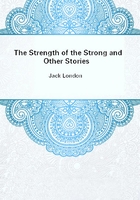
第9章 SOUTH OF THE SLOT(3)
Freddie Drummond and Bill Totts were two totally different creatures. The desires and tastes and impulses of each ran counter to the other's. Bill Totts could shirk at a job with clear conscience, while Freddie Drummond condemned shirking as vicious, criminal, and un-American, and devoted whole chapters to condemnation of the vice. Freddie Drummond did not care for dancing, but Bill Totts never missed the nights at the various dancing clubs, such as The Magnolia, The Western Star, and The Elite; while he won a massive silver cup, standing thirty inches high, for being the best-sustained character at the Butchers and Meat Workers' annual grand masked ball. And Bill Totts liked the girls and the girls liked him, while Freddie Drummond enjoyed playing the ascetic in this particular, was open in his opposition to equal suffrage, and cynically bitter in his secret condemnation of coeducation.
Freddie Drummond changed his manners with his dress, and without effort. When he entered the obscure little room used for his transformation scenes, he carried himself just a bit too stiffly.
He was too erect, his shoulders were an inch too far back, while his face was grave, almost harsh, and practically expressionless.
But when he emerged in Bill Totts' clothes he was another creature.
Bill Totts did not slouch, but somehow his whole form limbered up and became graceful. The very sound of the voice was changed, and the laugh was loud and hearty, while loose speech and an occasional oath were as a matter of course on his lips. Also, Bill Totts was a trifle inclined to late hours, and at times, in saloons, to be good-naturedly bellicose with other workmen. Then, too, at Sunday picnics or when coming home from the show, either arm betrayed a practised familiarity in stealing around girls' waists, while he displayed a wit keen and delightful in the flirtatious badinage that was expected of a good fellow in his class.
So thoroughly was Bill Totts himself, so thoroughly a workman, a genuine denizen of South of the Slot, that he was as class- conscious as the average of his kind, and his hatred for a scab even exceeded that of the average loyal union man. During the Water Front Strike, Freddie Drummond was somehow able to stand apart from the unique combination, and, coldly critical, watch Bill Totts hilariously slug scab longshoremen. For Bill Totts was a dues-paying member of the Longshoremen Union and had a right to be indignant with the usurpers of his job. "Big" Bill Totts was so very big, and so very able, that it was "Big" Bill to the front when trouble was brewing. From acting outraged feelings, Freddie Drummond, in the role of his other self, came to experience genuine outrage, and it was only when he returned to the classic atmosphere of the university that he was able, sanely and conservatively, to generalize upon his underworld experiences and put them down on paper as a trained sociologist should. That Bill Totts lacked the perspective to raise him above class-consciousness Freddie Drummond clearly saw. But Bill Totts could not see it. When he saw a scab taking his job away, he saw red at the same time, and little else did he see. It was Freddie Drummond, irreproachably clothed and comported, seated at his study desk or facing his class in SOCIOLOGY 17, who saw Bill Totts, and all around Bill Totts, and all around the whole scab and union-labour problem and its relation to the economic welfare of the United States in the struggle for the world market. Bill Totts really wasn't able to see beyond the next meal and the prize-fight the following night at the Gaiety Athletic Club.
It was while gathering material for WOMEN AND WORK that Freddie received his first warning of the danger he was in. He was too successful at living in both worlds. This strange dualism he had developed was after all very unstable, and, as he sat in his study and meditated, he saw that it could not endure. It was really a transition stage, and if he persisted he saw that he would inevitably have to drop one world or the other. He could not continue in both. And as he looked at the row of volumes that graced the upper shelf of his revolving book-case, his volumes, beginning with his Thesis and ending with WOMEN AND WORK, he decided that that was the world he would hold to and stick by.
Bill Totts had served his purpose, but he had become a too dangerous accomplice. Bill Totts would have to cease.
Freddie Drummond's fright was due to Mary Condon, President of the International Glove Workers' Union No. 974. He had seen her, first, from the spectators' gallery, at the annual convention of the Northwest Federation of Labour, and he had seen her through Bill Totts' eyes, and that individual had been most favourably impressed by her. She was not Freddie Drummond's sort at all.
What if she were a royal-bodied woman, graceful and sinewy as a panther, with amazing black eyes that could fill with fire or laughter-love, as the mood might dictate? He detested women with a too exuberant vitality and a lack of . . . well, of inhibition.
Freddie Drummond accepted the doctrine of evolution because it was quite universally accepted by college men, and he flatly believed that man had climbed up the ladder of life out of the weltering muck and mess of lower and monstrous organic things. But he was a trifle ashamed of this genealogy, and preferred not to think of it.
Wherefore, probably, he practised his iron inhibition and preached it to others, and preferred women of his own type, who could shake free of this bestial and regrettable ancestral line and by discipline and control emphasize the wideness of the gulf that separated them from what their dim forbears had been.